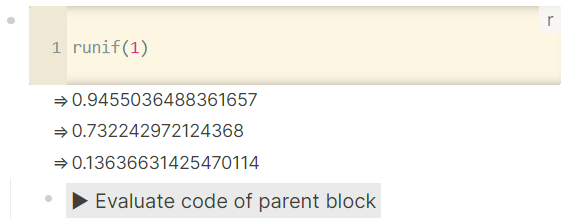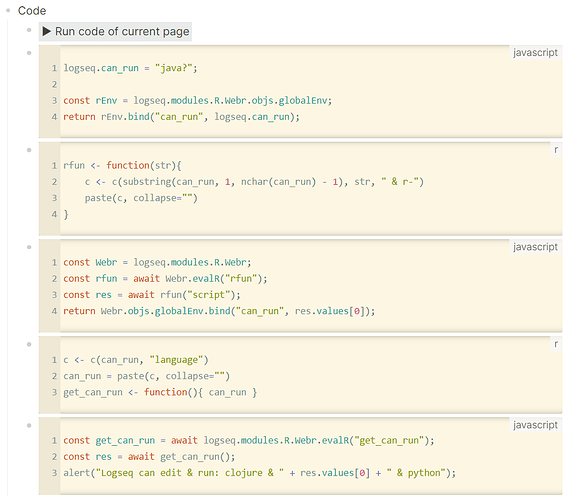- The theoretical background and discussion is here.
- This is a natural continuation of the work done in Edit and run javascript code inside Logseq itself
- The implementation there supports multiple languages, so it is not repeated here.
- This is opened as a separate thread, in order to hold the R-specific material and discussion.
Current Features:
- It loads WebR the first time that is needed per Logseq’s restart.
- It looks for file
webr-worker.jsinside Logseq’s installation (where fileelectron.jsis).- Can get the contents from the internet, by creating the file yourself and putting inside a single line:
importScripts('https://webr.r-wasm.org/latest/webr-worker.js');
- Can get the contents from the internet, by creating the file yourself and putting inside a single line:
- It looks for file
- It doesn’t load other packages.
- Instructions can be found online (e.g. here).
- All the integrated parts are provided from third parties.
- Their quality is not perfect.
- Use at own risk.
- Expect failures in various cases.
- Thoroughly test all code before using it in production.
- There is a known issue of a console message “Service worker request failed - resending request” with a one-minute interval.
- More info and abilities found in Edit and run javascript code inside Logseq itself, so not repeated here.
Check for the following messages during first run:


Simple example

Example of mixing and running javascript and R in the same page
Use the following markdown in a page:
- Code
- {{runpage}}
-
```javascript
logseq.can_run = "java?";
const rEnv = logseq.modules.R.Webr.objs.globalEnv;
return rEnv.bind("can_run", logseq.can_run);
```
-
```r
rfun <- function(str){
c <- c(substring(can_run, 1, nchar(can_run) - 1), str, " & r-")
paste(c, collapse="")
}
```
-
```javascript
const Webr = logseq.modules.R.Webr;
const rfun = await Webr.evalR("rfun");
const res = await rfun("script");
return Webr.objs.globalEnv.bind("can_run", res.values[0]);
```
-
```r
c <- c(can_run, "language")
can_run = paste(c, collapse="")
get_can_run <- function(){ can_run }
```
-
```javascript
const get_can_run = await logseq.modules.R.Webr.evalR("get_can_run");
const res = await get_can_run();
alert("Logseq can edit & run: clojure & " + res.values[0] + " & python");
```
Should look like this:
Press the button for javascript and R to collaborate back and forth, joining forces to produce a fact.
